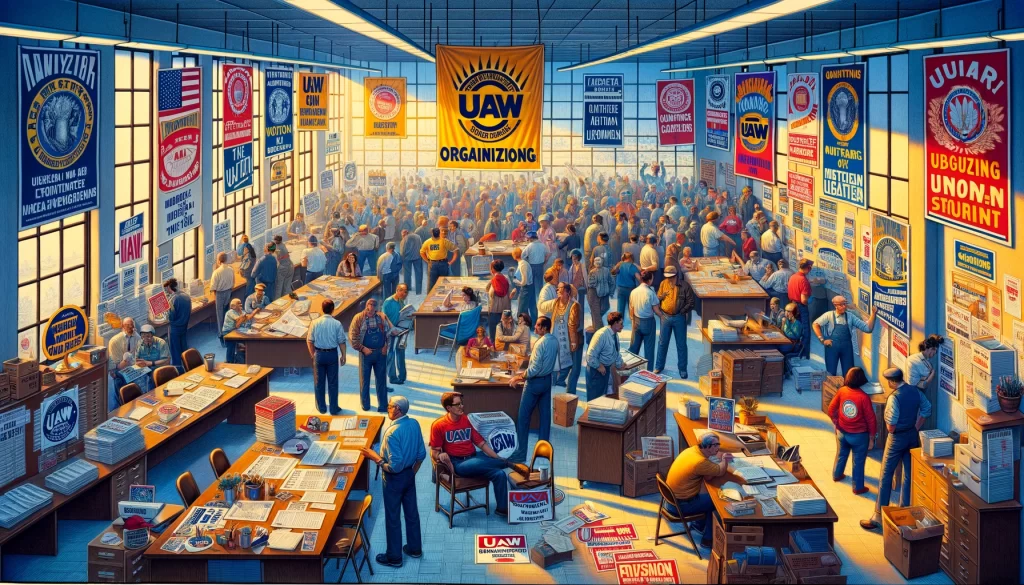The United Auto Workers (UAW) union is currently making significant moves in the southern United States. Let’s dive into this recent surge of activity and understand why it’s a big deal for workers and the automotive industry.
A New Wave of Unionization
In Vance, Alabama, employees at the Mercedes plant have taken a bold step towards unionizing by filing a petition for a union election. This is a groundbreaking move for workers at this plant. Similarly, in Chattanooga, Tennessee, Volkswagen workers are gearing up for their own union election. These efforts come after the UAW’s successful strike against the Big 3 automakers last fall, which led to historic contract agreements.
Jeremy Kimbrell, a 24-year veteran at Mercedes, expressed the workers’ enthusiasm: “We started signing [union] authorization cards Thanksgiving weekend, and it just stacked up quick. It was like workers were starving for it, and it took off.”
The Struggle in the South
Historically, the South has been challenging terrain for labor unions due to strong opposition and right-to-work laws, which prevent mandatory union membership. Despite previous setbacks, including failed unionization votes at the Volkswagen plant in 2014 and 2019, and numerous unsuccessful attempts at the Mercedes plant, the tide appears to be turning.

The UAW, undeterred by past obstacles, has committed $40 million to organize non-union plants. This dedication is paying off, as a majority of workers at both Volkswagen and Mercedes have shown support for unionizing.
Chasing Better Conditions
The drive for unionization is fueled by workers’ desire for better working conditions and fair compensation. Moesha Chandler, a worker at Mercedes, shared her experience. Initially attracted by the company’s reputation of paying its workers well, she soon found the reality of long hours and tough work for $24 an hour not worth the trade-off, especially under a two-tier wage system that was introduced in 2020. This system paid new hires less than existing employees, a policy that Mercedes reportedly revised amidst the union campaign.

The decline in compensation and the introduction of the two-tier system are seen as strategies by Mercedes to maintain profits while transitioning to electric vehicles, a costly endeavor. However, these changes have prompted workers like Chandler to become active supporters of the UAW, seeking wages and conditions similar to those won by union workers at Ford, General Motors, and Stellantis.
Resistance and Support
Not all workers are in favor of unionization. Jay White, a parts quality technician at Mercedes since 2005, warns of potential layoffs and increased costs due to higher wages. He’s noticed more support for the union now than in previous years but remains skeptical about the benefits of unionization.
The push for unionization has sparked criticism from some southern politicians as well, who argue that unions could harm Alabama’s automotive industry.
However, supporters like Kimbrell believe that the presence of established plants and a skilled workforce make the state an unlikely candidate for automakers to abandon, even if workers choose to unionize.
This article is based on the following article:

Background Information
To better understand the context of the unionization efforts at Mercedes and Volkswagen plants in the southern United States, it’s helpful to have some background information on several key topics, such as the history and role of labor unions, the concept of right-to-work laws, the significance of the automotive industry in the southern US, and the transition to electric vehicles.
Labor Unions: A Brief Overview
Labor unions are organizations that represent the collective interests of workers. They negotiate with employers on issues like wages, work hours, benefits, and working conditions. The United Auto Workers (UAW) is one of the largest and most influential labor unions in the United States, primarily representing workers in the automotive industry. Unions play a critical role in protecting workers’ rights and improving their employment conditions through collective bargaining.
Right-to-Work Laws
Right-to-work laws are state laws that prohibit agreements between labor unions and employers that make membership or payment of union dues or fees a condition of employment, either before or after hiring. These laws are in place in several U.S. states, predominantly in the South and Midwest. Advocates argue that these laws protect workers’ freedom to choose whether to join a union, while critics say they weaken labor unions and lead to lower wages and benefits for workers.
The Automotive Industry in the Southern US
Over the past few decades, the southern United States has become a significant hub for automotive manufacturing. Companies like Mercedes, Volkswagen, Toyota, and Hyundai have established major plants in states like Alabama, Tennessee, and South Carolina. This growth has been partly due to the region’s favorable economic conditions, including lower labor costs, tax incentives offered by state governments, and the presence of right-to-work laws. The automotive industry has brought thousands of jobs to the South, playing a vital role in the region’s economy.
Transition to Electric Vehicles (EVs)
The automotive industry is currently undergoing a significant transition from traditional internal combustion engines to electric vehicles (EVs). This shift is driven by environmental concerns, technological advancements, and regulatory policies aimed at reducing carbon emissions. Electric vehicles offer the promise of a more sustainable mode of transportation, but their production requires significant investment in new technologies and changes to existing manufacturing processes. This transition is challenging for automakers, who must balance the costs of innovation with the need to remain competitive and profitable.
Understanding the Context
The efforts to unionize at Mercedes and Volkswagen plants in the South occur against this complex backdrop. Workers are seeking better wages and working conditions at a time when the automotive industry is undergoing significant changes. The presence of right-to-work laws in the South adds an additional layer of complexity to these unionization efforts. By understanding these factors, students can better appreciate the significance of the UAW’s campaign and the challenges and opportunities facing labor unions and workers in the modern economy.

Debate/Essay Questions
- Debate the merits and drawbacks of right-to-work laws, considering their impact on workers’ rights, union strength, and the overall economy. Discuss whether these laws protect individual freedom or if they undermine labor unions and workers’ bargaining power.
- Is unionization beneficial for workers in the automotive industry?
- Should automakers resist or embrace union efforts in the South?
Please subscribe to Insight Fortnight, our biweekly newsletter!
